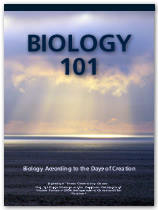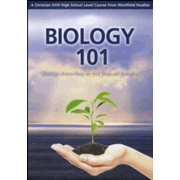Biology 101 is a unique contribution to the realm of Biology curricula. The core component is a set of four DVDs with 4.5 hours of course content that you can also access via streaming. This is a full, multi-media presentation in which Wes Olson "teaches" biology according to the days of creation.
It is worth knowing that the Biology 101 course was instigated by the success of a short film created by Wes and his sons. That film, titled "From Genesis to Genes," won first place in the Creation Category at Vision Forum's San Antonio Independent Christian Film Festival. Inspired by their success, the Olsons then turned their efforts toward creation of Biology 101. Chemistry 101 and Physics 101 are also available. They explain on their website that, "The objective of The 101 Series is to provide fascinating, visually–rich, and biblically–sound teaching, especially covering topics on which today's culture and Christianity conflict." Consequently, Biology 101 presents topics from a "young earth" perspective following the biblical chronology of six days of creation (with God resting on the seventh day).
Since this is a biology course rather than physics, astronomy, or geology, it doesn't cover all six days of creation. After an introduction that explains the framework and perspective of the course plus classification systems, it jumps to the third day of creation when plant life appears. Next, it skips ahead to the fifth day of creation and the study of aquatic creatures and the avian kingdom. Study of the creation of land animals and of man on the sixth day are followed by a final section on genetics that tackles tough issues such as genetic engineering, stem cell research, and cloning. These topics are presented in essentially seven sections, although video footage on land animals and mankind is broken down into two sections for each of these topics.
The production values are excellent. Filming is very creative, with graphics and other illustrations used frequently. Host Wes Olson is an engaging presenter, and he relates information to practical life experiences and adds touches of humor now and then to keep information from getting dry or boring.
The target audience for the videos might be the entire family. Parents and younger children (upper elementary grades through junior high) should find much of the content very interesting and understandable. However, the publisher intends this to serve primarily as a high school course. Clearly, 4.5 hours of video instruction does not comprise a complete high school level course. However, the publisher has created extra resources that help transform it into a full course. These are two PDF files that come with the course: Course Accreditation Program and Guidebook and Quizzes. The Course Accreditation Program lists activities for a 27-week course with approximately 135 hours of study. In addition to watching the videos, students read from and study the Guidebook, read resource and reference books (including juvenile fact books on biology topics), read Scriptures, take field trips, write essays, draw, discuss, and complete some "lab" activities. The 109-page Guidebook and Quizzes PDF includes "text" that is a slightly rewritten version of the video presentation. It also has six quizzes and their answer keys.
The course content is not nearly as challenging and comprehensive as most other high school level biology courses. You can make it so by choosing resource books that rise to that level, but those might be difficult to find as separate books for each topic. The lab activities are quite minimal compared to typical high school labs. For example, for "aquatics" the lab work is "Catch a fish! As you prepare it, try to identify the parts OR buy a goldfish and observe it. Identify its outer parts."
Students intending to major in the sciences or even those applying to competitive colleges might need more demanding course work and lab activities. In those situations, you might want to use a more traditional textbook and supplement with these videos rather than using the videos as the core curriculum.
Students who do not need an academically rigorous biology course and who prefer the creationist perspective should find this course a refreshing and enjoyable alternative.










